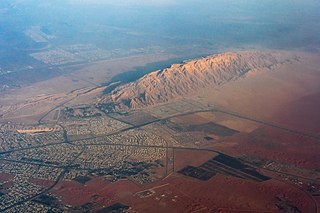
The United Arab Emirates is a high-income developing market economy. The UAE's economy is the 4th largest in the Middle East, with a gross domestic product (GDP) of US$415 billion in 2021-2023.
Transport in the United Arab Emirates refers to the various forms of transport in the United Arab Emirates (UAE) by road, rail, air, and water.

The United Arab Emirates (UAE), or simply the Emirates, is a country in West Asia, in the Middle East, at the eastern end of the Arabian Peninsula. It is a federal elective monarchy made up of seven emirates, with Abu Dhabi serving as its capital. It shares land borders with Oman to the east and northeast, and with Saudi Arabia to the southwest; as well as maritime borders in the Persian Gulf with Qatar and Iran, and with Oman in the Gulf of Oman. As of 2024, the UAE has an estimated population of over 10 million, of which 11% are Emiratis; Dubai is its most populous city and is an international hub. Islam is the official religion and Arabic is the official language, while English is the most spoken language and the language of business.

Zayed International Airport, also known as Abu Dhabi International Airport, is the primary international airport serving Abu Dhabi, the capital of the United Arab Emirates (UAE). It is the second busiest airport in the UAE after Dubai International Airport, one of the busiest airports in the Middle East and is the hub for Etihad Airways as well as an operating base for Wizz Air Abu Dhabi and Air Arabia Abu Dhabi.

Zayed Port also called Mina Zayed, is a commercial deep-water port owned by the Abu Dhabi Ports that serves Abu Dhabi, United Arab Emirates. Established in 1968, Zayed Port is in the northeast section of Abu Dhabi city. It was officially inaugurated and became fully operational in 1972, and is named after Sheikh Zayed bin Sultan Al Nahyan, the former President of the United Arab Emirates. The transfer of Zayed Port's container traffic to the newly developed US$7.2 billion Khalifa Port container terminal was completed in 2012.

Jabal Hafeet is a mountain in the region of Tawam, on the border of the United Arab Emirates and Oman, which may be considered an outlier of the Hajar Mountains in Eastern Arabia. Due to its proximity to the main Hajar range, the mountain may be considered as being part of the Hajar range. To the north is the UAE city of Al Ain, in the Eastern Region of the Emirate of Abu Dhabi, and the adjacent Omani town of Al-Buraimi.

AlBaik is a Saudi fast food restaurant chain headquartered in Jeddah, Saudi Arabia that primarily sells broasted and fried chicken with a variety of sauces. It is the largest restaurant chain in Saudi Arabia. Albaik currently has a trade name in 80 countries.
Al Ghurair Group, also known as Saif Al Ghurair Group, is a Dubai, United Arab Emirates–based business group founded by the Al Ghurair family. A diverse conglomerate, it has operations in the Middle East, North Africa, Europe and North America. The grandsons of Al Ghurair Group founder Ahmad Al Ghurair run the group. Abdul Rahman Saif Al Ghurair is chairman and Majid Saif Al Ghurair is the chief executive officer.
The history of the Jews in the United Arab Emirates describes the historical and modern presence of Jews over the millennia in the Middle East and the recorded meetings with Jewish communities in areas that are today in the geographic territories of the United Arab Emirates.

Abu Dhabi is the capital city of the United Arab Emirates. The city is the seat of the Abu Dhabi Central Capital District, the capital city of the Emirate of Abu Dhabi, and the UAE's second-most populous city, after Dubai. The city is situated on a T-shaped island, extending into the Gulf from the central-western coast of the UAE.

Khaldoon Khalifa Al Mubarak is an Emirati government official and business leader. Al Mubarak holds senior positions within the Government of Abu Dhabi, including as a member of the Executive Council since 2006, a member of the Supreme Council for Financial and Economic Affairs, and as the founding chairman of the Executive Affairs Authority. He fulfills responsibilities for the UAE Federal government and has served as Presidential Special Envoy to the People's Republic of China since 2018.
Majid Al Futtaim Holding is an Emirati holding company based in Dubai. The family-owned conglomerate owns and operates shopping malls, retail, and hotel establishments in the Middle East and North Africa.

LuLu Group International is a multinational conglomerate company that operates a chain of hypermarkets and retail companies, headquartered in Abu Dhabi, United Arab Emirates. It was founded in 2000 by M. A. Yusuff Ali from Nattika in Kerala, India. The Group mainly operates "Lulu Hypermarket", a chain of hypermarkets that ranks among the top grocers in many of the markets it operates in. LuLu has over 65,000 employees of various nationalities.
Expatriates in the United Arab Emirates represent about 88% of the population, while Emiratis constitute roughly 12% of the total population, making the UAE home to the world's highest percentage of expatriates after the Vatican City.
KEZAD or Khalifa Economic Zones Abu Dhabi - KEZAD Group was launched by AD Ports Group on September 19, 2022, as part of the plan to consolidate and grow its Economic Cities and Free Zones offering.
Amana Contracting and Steel Buildings is a UAE based industrial and commercial design-build construction company. It specializes in fast-track, turnkey construction of commercial, industrial and institutional low-rise facilities.
The following is a timeline of the history of the city of Abu Dhabi, United Arab Emirates.

Levi Duchman is the first resident chief rabbi of the United Arab Emirates. He also serves as the head of the Jewish congregation of Abu Dhabi, of the Jewish Community Center of UAE in Dubai, and as a member of the executive board of the Alliance of Rabbis in Islamic States.

Pickl is a chain of American-style fast food burger joints founded in the UAE in 2019. As of September 2023, Pickl has 18 locations in the UAE plus 2 franchised international restaurants in Bahrain, three in Egypt, and one in Qatar. It says on the Pickl website that 'it focuses on "fresh fast food" using premium ingredients that are free from hormones, preservatives, or antibiotics.'
ADNOC Distribution is a mobility retailer, founded in 1973 and headquartered in Abu Dhabi, United Arab Emirates (UAE). Specializing in the distribution and marketing of fuel products, the company offers a variety of services and products at its service stations, including gasoline, convenience store items, car services, and property leasing and management. ADNOC Distribution's fuel station network also includes ADNOC Oasis, a chain of over 300 convenience stores, providing a variety of food, beverage, and convenience items. The company operates in the UAE, Saudi Arabia, and Egypt.










